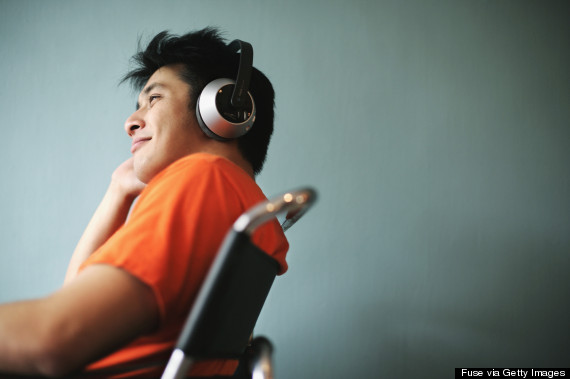Music’s neurological reach, and its historic role in healing and cultural rituals, has led researchers to consider ways music may improve our health and wellbeing. In particular, researchers have looked for applications in healthcare -- for example, helping patients during post-surgery recovery or improving outcomes for people with Alzheimer’s. In some cases, music’s positive impacts on health have been more powerful than medication.
Here are five ways that music seems to impact our health and wellbeing.
Music reduces stress and anxiety.
 Music can prevent
Music can prevent
anxiety-induced increases in heart rate and systolic blood pressure,
and decrease cortisol levels -- all biological markers of stress. In
one study,
researchers found that patients receiving surgery for hernia repair who
listened to music after surgery experienced decreased plasma cortisol
levels and required significantly less morphine to manage their pain. In
another study
involving surgery patients, the stress reducing effects of music were
more powerful than the effect of an orally-administered anxiolytic drug.
Performing
music, versus listening to music, may also have a calming effect. In
studies with adult choir singers, singing the same piece of music tended
to synch up their breathing and heart rates, producing a group-wide
calming effect. In a
recent study,
272 premature babies were exposed to different kinds of music -- either
lullabies sung by parents or instruments played by a music therapist --
three times a week while recovering in a neonatal ICU. Though all the
musical forms improved the babies’ functioning, the parental singing had
the greatest impact and also reduced the stress of the parents who
sang.
Though it’s sometimes hard in studies like this to separate
out the effects of music versus other factors, like the positive impacts
of simple social contact, at least
one recent study
found that music had a unique contribution to make in reducing anxiety
and stress in a children’s hospital, above and beyond social
contributions.
Music decreases pain.

Music has a unique ability to help with pain management, as I found in my own experience with giving birth. In
a 2013 study,
sixty people diagnosed with fibromyalgia -- a disease characterized by
severe musculoskeletal pain -- were randomly assigned to listen to music
once a day over a four-week period. In comparison to a control group,
the group that listened to music experienced significant pain reduction
and fewer depressive symptoms.
In
another recent study,
patients undergoing spine surgery were instructed to listen to
self-selected music on the evening before their surgery and until the
second day after their surgery. When measured on pain levels post
surgery, the group had significantly less pain than a control group who
didn’t listen to music.
It’s not clear why music may reduce pain,
though music’s impact on dopamine release may play a role. Of course,
stress and pain are also closely linked; so music’s impact on stress
reduction may also partly explain the effects.
However, it’s unlikely that music’s impact is due to a simple placebo effect. In a
2014 randomized control trial
involving healthy subjects exposed to painful stimuli, researchers
failed to find a link between expectation and music’s effects on pain.
The researchers concluded that music is a robust analgesic whose
properties are not due simply to expectation factors.
Music may improve immune functioning.

Can listening to music actually help prevent disease? Some researchers think so.
Wilkes University researchers
looked
at how music affects levels of IgA -- an important antibody for our
immune system’s first line of defense against disease. Undergraduate
students had their salivary IgA levels measured before and after 30
minutes of exposure to one of four conditions -- listening to a tone
click, a radio broadcast, a tape of soothing music or silence. Those
students exposed to the soothing music had significantly greater
increases in IgA than any of the other conditions, suggesting that
exposure to music (and not other sounds) might improve innate immunity.
Another study
from Massachusetts General Hospital found that listening to Mozart’s
piano sonatas helped relax critically ill patients by lowering stress
hormone levels, but the music also decreased blood levels of
interleukin-6 -- a protein that has been implicated in higher mortality
rates, diabetes and heart problems.
According to a
2013 meta-analysis,
authors Mona Lisa Chanda and Daniel Levitin concluded that music has
the potential to augment immune response systems, but that the findings
to date are preliminary. Still, as Levitin notes in one article on the
study, “I think the promise of music as medicine is that it’s natural
and it’s cheap and it doesn’t have the unwanted side effects that many
pharmaceutical products do.”
Music may aid memory.

Music
enjoyment elicits dopamine release, and dopamine release has been tied
to motivation, which in turn is implicated in learning and memory. In a
study published last year,
adult students studying Hungarian were asked to speak, or speak in a
rhythmic fashion, or sing phrases in the unfamiliar language.
Afterwards, when asked to recall the foreign phrases, the singing group
fared significantly better than the other two groups in recall accuracy.
Evidence
that music helps with memory has led researchers to study the impact of
music on special populations, such as those who suffer memory loss due
to illness. In a
2008 experiment,
stroke patients who were going through rehab were randomly assigned to
listen daily either to self-selected music, to an audio book or to
nothing (in addition to receiving their usual care). The patients were
then tested on mood, quality of life and several cognitive measures at
one week, three months and 6 months post-stroke. Results showed that
those in the music group improved significantly more on verbal memory
and focused attention than those in the other groups, and they were less
depressed and confused than controls at each measuring point.
In a
more recent study,
caregivers and patients with dementia were randomly given 10 weeks of
singing coaching, 10 weeks of music listening coaching, or neither.
Afterwards, testing showed that singing and music listening improved
mood, orientation and memory and, to a lesser extent, attention and
executive functioning, as well as providing other benefits. Studies like
these have encouraged a movement to incorporate music into patient care
for dementia patients, in part promoted by organizations like Music and
Memory.
Music helps us exercise.

How
many of us listen to rock and roll or other upbeat music while working
out? It turns out that research supports what we instinctively feel:
music helps us get a more bang for our exercise buck.
Researchers in the United Kingdom
recruited
thirty participants to listen to motivational synchronized music,
non-motivational synchronized music or no music while they walked on a
treadmill until they reached exhaustion levels. Measurements showed that
both music conditions increased the length of time participants worked
out (though motivational music increased it significantly more) when
compared to controls. The participants who listened to motivational
music also said they felt better during their work out than those in the
other two conditions.
In another study, oxygen consumption levels
were measured while people listened to different tempos of music during
their exercise on a stationary bike. Results showed that when
exercisers listened to music with a beat that was faster and synchronous
with their movement, their bodies used up oxygen more efficiently than
when the music played at a slower, unsynchronized tempo.
According
to sports researchers Peter Terry and Costas Karageorghis, “Music has
the capacity to capture attention, lift spirits, generate emotion,
change or regulate mood, evoke memories, increase work output, reduce
inhibitions and encourage rhythmic movement -- all of which have
potential applications in sport and exercise.”
This article originally appeared on Greater Good, published by the Greater Good Science Center at UC Berkeley. For more, please visit greatergood.berkeley.edu.












